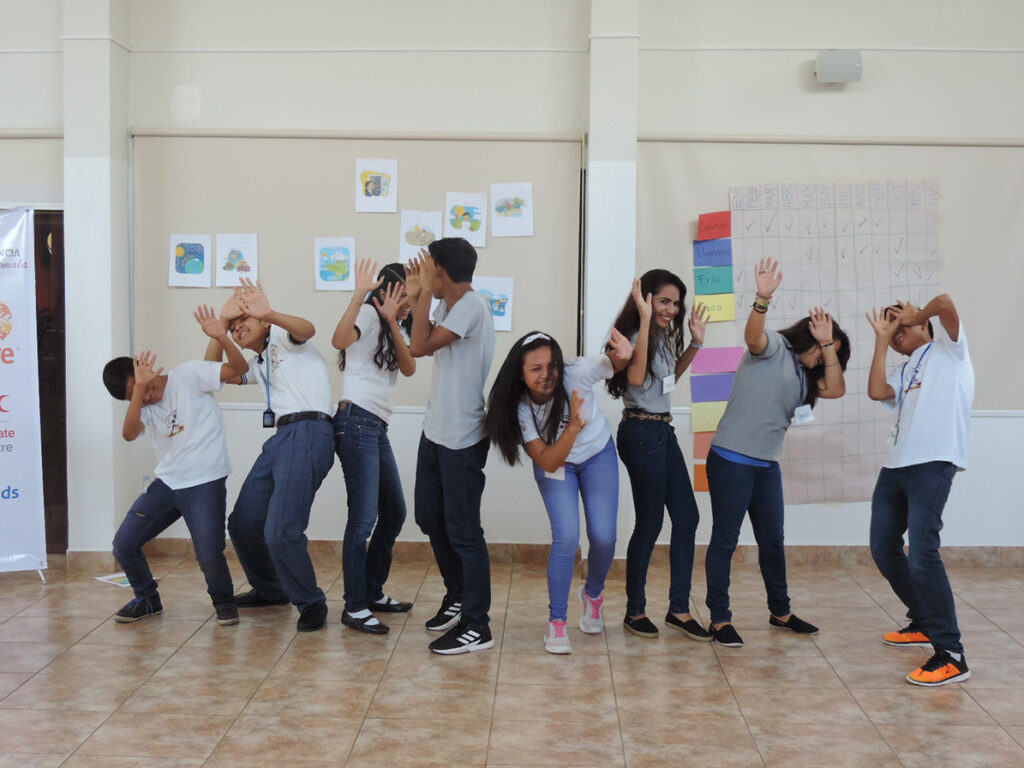A journey with youth to strengthen action on water and climate
T he Valuing Water Initiative is pleased to announce a new partnership with IUCN, AquaFed, KWR Water Research Institute and the Red Cross Red Crescent Climate Centre to establish a Valuing Water Youth Journey. This VWI-funded collaboration seeks to catalyse meaningful youth engagement and action on water and climate.

With a vision to fully integrate youth values, initiatives and ideas into water governance and management, this partnership contributes to water and climate resilience and sustainability.
The IUCN-led Consortium of partners brought together under the Valuing Water Youth Journey harness the expertise and complementarity needed to catalyse systemic change in how young people engage in water and climate decision-making and action. Together, we will engage from local to global levels, deploying our networks to realize the Youth Journey vision.
– Maria Carreño Lindelien, IUCN Water and Land Management Team
The Youth Journey seeks to build momentum around three main areas:
Youth Capacity
Youth are better equipped to understand and take action on water-related risks in a changing climate, with a wider range of opportunities being created to match their skills. Activities will include the implementation of programmes to equip young people with practical and technical knowledge and skills to strengthen their participation and collaboration with institutions responsible for water governance and management.
Inclusive planning of career pathways for young people in water will make for a diverse and transversal future workforce in the sector. As part of the Youth Journey, we will engage young people and water institutions to shape what this looks like.
– Neil Dhot, Executive Director of Aquafed
Youth Action
Local youth action to address water-related challenges in a changing climate are formally recognised and implemented as part of official planning and program delivery. Activities will include supporting young people in implementing local initiatives, convening youth advocacy groups and integrating young people in the roll-out of water projects.
Young people have the potential to become agents of change in their communities by taking action to adapt to the effects of climate change. Through our work under the youth journey we plan to implement sustainable approaches that will enable young people to implement local water and climate initiatives and advocate for change.
– Sanne Hogesteeger, Programme Coordinator, Red Cross Red Crescent Climate Centre
Youth contributions to change
Youth contribution to local, regional and global water governance and management-related dialogues is the norm, not the exception. Activities will include the creation of intergenerational dialogues for knowledge exchange as well as convening and supporting youth groups to create a roadmap for advocacy.
By building bridges amongst youth initiatives and contributing to a shift in mindsets within water institutions, we seek to drive recognition of the important role that young people need to play as equal partners striving for climate and water security
– Raul Glotzbach, Scientific researcher – Innovation & Valorisation, KWR Water Research Institute
The Youth Journey has a global scope with emphasis on engaging young people in the global south, through the creation of regional hubs. The exact location for these hubs is still being decided, with the main goal that they are representative of the diversity of contexts in which youth advocacy is taking place.
The Valuing Water Initiative recognises the important role that young people can and should play in shaping how water is governed and managed. This Youth Journey seeks to tackle the obstacles to meaningful youth engagement and catalyse youth action on water
– Joe Ray, Senior Advisor at the Valuing Water Initiative
Research on obstacles to meaningful youth engagement carried out by the Water Youth Network in 2021 found that despite recent progress, young people are frequently underrepresented and disempowered in water management and governance processes. Specific challenges include:
(i) Hierarchical decision-making processes in which youth are excluded by default;
(ii) Youth participation being treated superficially or seen as an end in itself (tokenism);
(iii) The exclusion of those lacking specific technical training or education despite water’s status as a public good;
(iv) Language barriers preventing meaningful inclusion of non-English speakers;
(v) Limited opportunities for capacity development especially in the Global South; and
(vi) Fragmentation between youth-focused initiatives that limits their collective impact.
In combination with the outcomes and its associated activities, the roll-out of this Journey will be supported by a Valuing Water Youth Taskforce. This global, multistakeholder coalition will comprise youth and other organisations committed to strengthening the representation and empowerment of young people in water management and governance around the world.
For more information on the Valuing Water Youth Journey, please contact Maria Carreño Lindelien, IUCN Water and Land Management Team.
For more information on the Valuing Water Youth Taskforce, please contact Joe Ray, VWI Senior Advisor.
Related posts